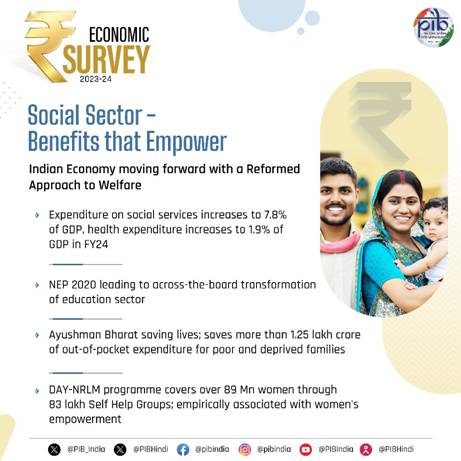
India’s social and institutional progress in recent years has been achieved through an empowering approach to welfare as the new approach focuses on transforming the implementation and cost effectiveness of the Government programmes. The approach comprises targeted implementation of reforms for last-mile service delivery and affordable social security schemes for the unorganized sector workers through schemes such as Atal Pension Yojana (APY). This was stated by the Economic Survey 2023-24 tabled by Union Minister for Finance and Corporate Affairs Smt. Nirmala Sitharaman in the Parliament today.

Decline in Multidimensional Poverty
The expenditure on social services has increased from 6.7 % of GDP in 2017-18 to 7.8 % of GDP in 2023-24. The enhanced economic thrust along with better implementation of programmes has led to a sharp decline of Multidimensional Poverty with (National) Multidimensional Poverty Index (MPI) nearly halving from 0.117 in 2015-16 to 0.066 in 2019-21. Resultantly, 13.5 crore Indians are estimated to have escaped multidimensional poverty between 2015-16 and 2019-21, the Economic Survey 2023-24 noted.
The trend is driven by rural India, with the most significant improvements occurring in states like Bihar, Madhya Pradesh, Uttar Pradesh, Odisha and Rajasthan. Uttar Pradesh registered the most significant decline in the number of poor people, with 3.43 crore people escaping multidimensional poverty between 2015-16 and 2019-21.
Reduced Inequality and Decline in Rural-Urban divide
The Economic Survey also points out that the results of various initiatives in the social sector have translated into reduced inequality. The Gini coefficient has declined from 0.283 to 0.266 for the rural sector and from 0.363 to 0.314 for the urban sector in the past decade.
Similarly, the rural-urban divide has also declined considerably, as the difference between rural and urban monthly per capita consumption expenditure (MPCE) declined from 83.9 % in 2011-12 to 71.2 % in 2022-23.
***
